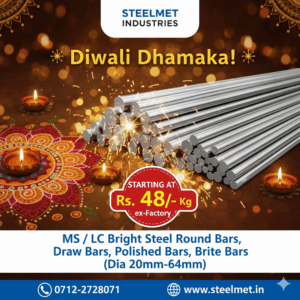If you are selecting steel for gears, shafts, or automotive components, you’ve likely come across 16MnCr5, 18MnCr5, and 20MnCr5 — the most popular case hardening steel grades standardized under EN 10084. But what exactly sets them apart?
In this post, Steelmet Industries breaks down the differences, applications, compositions, and machinability of these grades to help buyers and manufacturers choose the right material.
🔍 What are 16MnCr5, 18MnCr5, and 20MnCr5?
All three are low-alloy, case-hardening (carburizing) steels designed for parts that need a tough core with a hard, wear-resistant surface.
They primarily differ in their carbon and manganese contents, which affect hardenability, case depth, and mechanical strength.
📊 Chemical Composition Comparison (as per EN 10084)
| Grade | C (%) | Mn (%) | Cr (%) | P max (%) | S max (%) |
|---|---|---|---|---|---|
| 16MnCr5 | 0.14–0.19 | 1.00–1.30 | 0.80–1.10 | 0.025 | 0.035 |
| 18MnCr5 | 0.15–0.20 | 1.10–1.40 | 0.90–1.20 | 0.025 | 0.035 |
| 20MnCr5 | 0.17–0.22 | 1.10–1.40 | 1.00–1.30 | 0.025 | 0.035 |
Observation:
As we move from 16MnCr5 to 20MnCr5:
Carbon content increases → deeper case hardening
Manganese and chromium slightly increase → better hardenability and wear resistance
⚙️ Mechanical Properties (After Case Hardening)
| Property | 16MnCr5 | 18MnCr5 | 20MnCr5 |
|---|---|---|---|
| Case Hardness (HRC) | 58–62 | 58–63 | 60–64 |
| Core Tensile Strength | ~900 MPa | ~950 MPa | ~1000 MPa |
| Case Depth | 0.8–1.2 mm | 0.9–1.3 mm | 1.0–1.4 mm |
🧰 Applications
| Grade | Typical Uses |
|---|---|
| 16MnCr5 | Small gears, camshafts, transmission components, crankshafts |
| 18MnCr5 | Gearboxes, valve parts, pinions, moderately stressed transmission parts |
| 20MnCr5 | Heavy-duty gears, large shafts, automotive gear sets, highly stressed precision components |
🧪 Machinability & Heat Treatment
Machinability: All three grades are machine-friendly in the annealed condition.
Carburizing Range: 880–950°C
Hardening: 800–850°C followed by oil or water quenching
Tempering: 150–200°C (for stress relief)
🌟 Why Choose Steelmet Industries?
At Steelmet Industries, we supply case hardening steels like 16MnCr5, 18MnCr5, and 20MnCr5 in:
Rounds, Squares, Flats, Hexagons
Custom profiles like D-bars, Half-rounds, Tapered flats
Hot Rolled, Peeled, and Bright Bar Finishes
✅ Full Traceability
✅ Vacuum Degassed (VD Route) Option
✅ IS, EN, DIN, AISI, and SAE Equivalents available
📞 For inquiries: Visit www.steelmet.in or contact us today.
❓ Frequently Asked Questions (FAQ)
Q1: Can I replace 16MnCr5 with 20MnCr5?
A: In most cases, yes — especially if you need better core strength and deeper case hardening. But always consult with your metallurgist or supplier.
Q2: Are these grades weldable?
A: They have limited weldability due to high carbon. Pre-heating and post-weld heat treatment are usually required.
Q3: Do these grades support induction hardening?
A: Yes, all three are suitable for both carburizing and induction hardening processes.
Q4: Is VD Route important for these grades?
A: Absolutely. Vacuum degassed material ensures low hydrogen and gas content, preventing failures during heat treatment.
✅ Conclusion
Choosing between 16MnCr5, 18MnCr5, and 20MnCr5 depends on the required case depth, wear resistance, and core strength of the component. While all three grades meet the EN 10084 standard for case hardening steels, their slight variations in composition can significantly impact performance in service.
For example, 20MnCr5 offers deeper case hardening and higher tensile strength, making it ideal for heavy-duty gears and shafts, while 16MnCr5 remains a cost-effective choice for moderately stressed automotive parts.
These steels are widely available in rounds, squares, flats, hexagons, and special profiles through select suppliers with the capability to offer tight dimensional tolerances, VD route options, and full traceability — essential for critical components in transmission systems and precision machinery.
Manufacturers and OEMs looking to optimize performance while maintaining consistency can benefit from sourcing these grades from reliable producers who not only adhere to international standards but also offer customization and documentation support.


